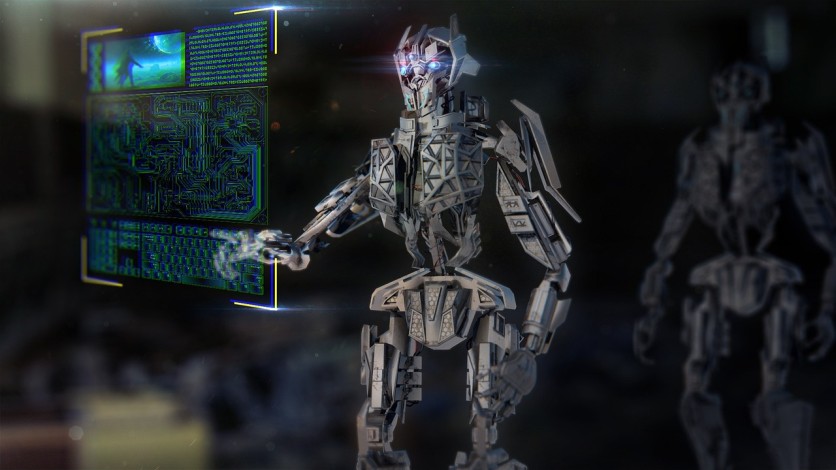
The dawn of a new era in business is upon us, bringing with it the promise of unprecedented growth and prosperity. By 2030, the US GDP is projected to see a staggering 21 percent net increase - a windfall primarily attributed to the burgeoning field of artificial intelligence (AI). But how exactly is AI catalyzing this economic boom? Which sectors stand to benefit the most?
This article shines a light on these pertinent questions, delving into the intricacies of AI and its transformative potential. From automating mundane tasks, some SEO work, and making complex decisions, AI is truly reshaping the business landscape.
Read on and discover the top five key areas where businesses can integrate AI to unlock untapped potential and foster sustainable growth.
What is artificial intelligence?
Artificial intelligence, commonly known as AI, is an intriguing field of computer science. It's like teaching a child to learn, but at a grander scale and with machines. AI empowers computers to mimic human intelligence, reason, and respond to stimuli. Imagine a world where machines learn from experiences, adjust to new inputs, and accomplish tasks that require human-like thinking. That's AI for you!
But here's the exciting part. It's not just about programming a series of commands. Instead, it's about building systems capable of deep learning patterns on their own. AI algorithms, fuelled by colossal datasets, enable machines to improve their performance without explicit programming.
This profound learning aspect of AI is the cornerstone of modern technological advancements. In other words, it's not just about intelligent machines; it's about machines getting smarter on their own.
A brief history of Artificial Intelligence and business processes
The journey of AI in business mirrors a thrilling sci-fi epic. It began in the late 1950s when John McCarthy breathed life into the first programming language for AI, known as LISP. This revolutionary tool laid the groundwork for future AI applications.
In the same era, George Devol invented Unimate, an industrial robot, and an early AI icon. Unimate transformed manufacturing processes, introducing unprecedented efficiency and precision. It was a watershed moment in industrial history, marking AI's first foray into business.
Over subsequent decades, AI evolved rapidly, expanding its influence across diverse sectors. Today, from personalizing customer experiences to predicting market trends, AI is an indispensable business ally. It's not just a tool; it's a business revolution. The story of AI and business is a continual evolution - from a budding concept in the 1950s to a game changer in the present day.
The importance of leveraging AI technology in today's age
In today's fast-paced, data-driven world, AI tools are the compass guiding businesses through a sea of information. Harnessing AI isn't a luxury; it's a necessity. AI implementation is the fulcrum upon which competitive advantage pivots, transforming raw data into actionable insights.
Think of AI as a crystal ball, forecasting market trends with remarkable accuracy. It predicts customer behavior, enabling personalized experiences that foster brand loyalty. AI is a silent workhorse, tirelessly automating routine tasks, freeing humans for high-value work.
Moreover, the power of AI in risk management cannot be overstated. It sniffs out anomalies in real time, providing a robust shield against cyber threats. AI is indeed the game-changer in the digital arena, reshaping industries and redefining success. Leveraging AI is not just about keeping pace with technology; it's about leading the race.
5 Key Areas To Integrate AI Into Businesses

Be ready to embark on a fascinating journey as we unveil five exciting domains where AI is making significant strides for your business needs. From enhancing productivity to ensuring security, let's delve into integrating AI for business growth and its transformative power in these critical areas.
1) Customer experience revolution with AI solutions
The use of AI is poised to revolutionize customer experience, injecting smarter, faster, and more personalized interactions. Imagine a chatbot that not only answers your queries but anticipates your needs. AI-powered chatbots like ChatGPT are becoming the new customer support superstars thanks to natural language processing (NLP), which is available round the clock and equipped to handle multiple queries simultaneously.
Moreover, AI systems can churn through big data pools to glean nuanced customer behavior patterns. This insight enables businesses to tailor marketing strategies, creating personalized experiences that foster loyalty and drive revenue.
In essence, AI is transforming customer experience from a reactive process into a proactive, personalized journey.
2) Supply chain and inventory management
AI is revolutionizing supply chain and inventory management, infusing a new level of precision and efficiency. Imagine having a crystal ball that predicts demand, optimizing your inventory and POS systems before a sale even happens. AI achieves this with uncanny accuracy, analyzing historical data and market trends to forecast demand.
This prediction significantly reduces inventory costs while preventing stockouts, and it doesn't stop there. AI can also streamline logistics, predicting the best delivery routes to minimize time and fuel consumption. The result is a lean, green, cost-effective AI-driven business transformation.
3) Automating repetitive tasks
Automation warrants a standing ovation, particularly when it comes to repetitive tasks. AI technology, the maestro of automation, elegantly conducts a symphony of tasks, freeing human talent for more creative pursuits.
Consider the humble data entry job, a notoriously time-consuming task. AI can swiftly process mountains of data with unparalleled accuracy, eliminating human error. It's like having a meticulous, indefatigable employee working around the clock.
Moreover, AI isn't limited to monotonous tasks. It can automate complex workflows like report generation, transforming a dreary chore into a simple click of a button. The result is less grunt work and more strategic thinking. In the grand theatre of business, AI integration in business sectors is the unsung hero, quietly orchestrating backstage magic.
4) Manufacturing and production optimization
Some AI projects are the Swiss Army knife of manufacturing, versatile and efficient with many use cases. It's about more than just process automation; it's about smart optimization. Picture a factory where cobots, powered by machine learning algorithms, collaborate with humans. They streamline assembly lines, reducing waste and boosting productivity.
One of the best benefits of AI models is that it even predicts machine failures, scheduling preventative maintenance to minimize downtime. It would also ensure you are compliant with all regulations, as you can program AI to check for such compliance.
In essence, it's about creating a smart factory and enhancing efficiency through intelligent decisions. This is why it is excellent to incorporate it into your business strategy. AI's role in manufacturing is not replacing humans, but empowering them to accomplish more.
5) Entertainment and media
AI is radically reshaping the entertainment and media landscape, fostering a new era of personalized content. It's like having a virtual concierge intuitively curating a bespoke entertainment platter tailored to individual preferences. AI analyses viewing patterns and tastes, predicting what you'd enjoy next.
Moreover, sophisticated AI algorithms are powering generative AI that delivers high-quality content for social media and other platforms. They are also capable of creative tasks, from generating music to scripting films. AI is pushing the boundaries of creativity, challenging our perception of art.
Not merely a passive tool, AI is an active participant, transforming the viewing experience into an interactive journey, tailoring content in real time. Its contributions are undeniably revolutionizing the entertainment industry.
A Glimpse Into the Future of AI Technology in Business
As we peer into the future, it's clear that AI's influence on business is set to surge. It promises a world where predictive analytics drive sharp decision-making, and automation propels efficiency. AI might become an invisible yet ubiquitous partner, fuelling business innovation and growth from SMEs to multinational corporations.
In conclusion, the integration of AI into business operations is no longer an option; it's a prerequisite for success. It's all about embracing this technological revolution and harnessing its power to drive strategic advantages. As AI continues to evolve, the businesses that anticipate and adapt to these changes are the ones that will remain at the forefront of their industries.
ⓒ 2026 TECHTIMES.com All rights reserved. Do not reproduce without permission.




